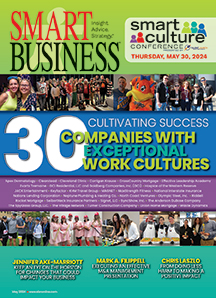 In October, about 120 people gathered at the City Club on Bunker Hill for SBN Live. The luncheon event featured a panel consisting of Mohan Maheswaran, president and CEO of Semtech Corp.; Jeff Kupietzky, president and CEO of Oversee.net; and David Hankin, CEO of the Alfred Mann Foundation.
In October, about 120 people gathered at the City Club on Bunker Hill for SBN Live. The luncheon event featured a panel consisting of Mohan Maheswaran, president and CEO of Semtech Corp.; Jeff Kupietzky, president and CEO of Oversee.net; and David Hankin, CEO of the Alfred Mann Foundation.
The three discussed the challenges that they have faced in leading during tough economic times and other leadership issues they face in their positions.
What challenges have you faced in your role over the past couple of years?
Mohan Maheswaran: Semtech is a global chip company. We make chips for all types of end system users like computers, cell phones, things like that. We have about $500 million in revenue, and we have design centers and manufacturing centers all over the world. The biggest challenges we have faced in recent times really are focused on a couple of areas.
The biggest area is the globalization of our demand. Historically, most of the demand for our chips has come from North America and Europe, but the biggest growth of demand is coming from different regions of the world, like China. That means we have to think differently about how do we expand geographically, how do we manage to understand the demand that’s coming from a different set of companies and different regional requirements than we are historically used to.
The other aspect of that is we are seeing a lot of competitors that are emerging that have not historically been our competitors. We have taken this as a challenge and tried to figure out how do we strategize and how do we make sure that when we have a customer in China or Korea that has not historically been our customer, that we have a good understanding of how to create a good relationship with them as if they were a North American or European customer.
The other thing is we looked at China, and we focused very much on building a local entity there.
Jeff Kupietzky: We were founded about 10 years ago by two entrepreneurs. They were good friends. One went to UCLA. One went to USC — probably the first time those two schools ever collaborated on anything. They created this company to put ads on websites even if that website didn’t have any content. That became the beginning of what was the opportunity to buy domain names and look at that as a long-term asset that they could own. Their brilliance was being able to register millions of names before people realized this was going to be big. The company today owns over 1 million domain names within our portfolio. The company then expanded by offering services to the people who owned those domain names and said, ‘What else do you need to help manage this?’ … Today, the company manages over 10 million names. That’s primarily undeveloped property for third-party owners.
The company grew very quickly. Like most dot-com companies even after the ’01 crash, we had our full complement of free massages and free food and lots of perks and numbers that only went up and to the right. About two years ago, besides the global recession, a lot of things changed. First, we were very dependent on Google. They were the big player on the block. We had made an early bet on them before they were a big player. That turned out to be good for our business, but as they became a significant part of our revenue, I like to joke that when they got sick, we checked ourself into the hospital.
The industry as a whole was getting more regulation so there was more scrutiny being placed on what was considered good quality traffic, how our advertisers were looking at the clicks they were receiving. We had to decide what was going to be the new quality metric.
Then our company itself went through some internal challenges as the founders sold down their stake and turned the reins over to a private equity firm and they made a decision to replace the CEO and asked a young manager in the company — myself — to take a first crack.
So we were facing a set of challenges and what brought us here was not what was going to take us to the future.

